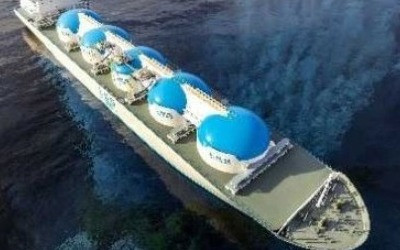How technology will allow the oil and gas industry to thrive in a world moving towards net zero
May 30, 2022

Like many other industries, the oil and gas sector is looking to adopt digital technology to help improve efficiency and productivity, especially as digitisation is a key development that will contribute to the world moving towards net zero. In the UK, it is believed that in meeting net zero by 2050, the country may still use a quarter of the gas that it uses now, so utilising digital technology and ensuring optimal production efficiency remains highly relevant.
At the same time, innovation, and the development of digital technologies during the transition period between changing energy production methods will be crucial in advancing low carbon solutions. Therefore, not only will the implementation of digital technology in the oil and gas industry strengthen the core business, but it could also help to develop sustainable energy production methods and support the push towards net zero.
Increasing safety and efficiency with innovative technology
A key reason for firms wanting to increase their efficiency, is to solidify their levels of stability in an unpredictable market. In fact, so many businesses are investing in oil and gas automation technology that Frost & Sullivan forecast the market to be worth $24.6 billion by 2025, with a compound annual growth rate of 7.5%. This includes the implementation of big data analytics, which has played a large role in driving industry growth in recent times.
New technology has allowed the oil and gas industry to become more data-driven and streamlined. Big data can help oil and gas companies gather real-time information, which can then be used to grasp new opportunities and ensure accuracy when searching for new hydrocarbon deposits. It can also be used to optimise exploration, drilling, and production by forecasting potential equipment failures and breakdowns – which will improve overall efficiency of whole projects.
With the oil and gas industry featuring large, complex, and often dangerous operations, having the technology to navigate volatile working environments is key, especially in downstream projects. Some oil and gas facilities are in confined or hard-to-reach spaces, so robotic inspection devices minimise the risk to personnel.
Robotic devices are proven to be effective in isolated areas, as well. In 2020, TotalEnergies deployed a surveillance robot at its gas plant in the Shetland Islands to accurately assess their robustness, endurance, and reliability in a difficult operating environment. These robots would “undertake rounds autonomously, detect anomalies, alert operators, monitor process parameters and generate 3D maps”.
For dangerous jobs relating to midstream processes and gas leaks, future technologies such as drones are also being developed for surveillance and detection purposes, to both minimise human interaction with dangerous substances and help mitigate emissions.
High profile collaborations
Cross-industry collaborations between oil and gas and digital solutions companies is more prevalent than ever, with oil and gas companies investing more in key growth technologies such as cloud and AI. The Internet of Things (IoT) vendors are now competing for top oil and gas contracts by offering end-to-end solutions. For oil and gas businesses, a collaborative approach with external suppliers is seen as a more effective solution than in house development of advanced analytics and Artificial Intelligence (AI).
Several high-profile partnerships have been made in the last couple of years, including Total Oil and Google Cloud, BP, and Azure, and Seeq and Saudi Aramco. A partnership between Malaysia’s Petronas and Waygate Technologies Robotics (WTR) has produced a robotic inspection device for the oil and gas industry that could be commercialised, and the technology in this project features a cleaning tool and additional ultrasonic and eddy inspection capabilities.
How can Petroplan help you get involved with the digital transformation of the oil and gas industry?
We are the champions of talent, and constantly stay up to date with the latest trends and changes in the oil and gas industry, and in this case, how digital technology is affecting the market. We have over 40 years’ experience in recruiting the best professionals into the energy sector, and we would have never achieved this without our agile approach and constantly adapting to change.
With the oil and gas industry changing, and digital transformation driving the emergence of new roles and specialisms, we are on hand to find opportunities for skilled professionals who can make a real impact. Find out more about us and, if you’re interested in learning more about digital transformations in the industry, please contact us to find out how we can help you.
Related Articles
Making global mobility a core strength for Petroplan, with Shannon Johnson, Business Support Manager, USA
Shannon Johnson is a heavy hitter for the Petroplan operations team. On any single day she will be juggling candidate visa processes, managing multiple clients and keeping immigration attorneys close to ensure compliance at every stage.
We asked Shannon about her role, her motivations, and her hopes for the future.
Can you tell us a bit about your career journey and what led you to this role?
I began working in the Oil and Gas Industry in 2010 with a focus on international immigration for Oil and Gas Clients. At first I processed work permits and mobilized UK and US nationals for projects in Africa (Angola – Congo), then Saudi Arabia, Equatorial Guinea, and Brazil and so on.
As my career progressed, I gained the knowledge that’s essential for successful US Immigration and Compliance, which has helped me in developing and managing several key clients at Petroplan.
Now my role means supporting our clients’ day-to-day operations, and candidates with mobilization and then throughout their employment with Petroplan.
What has been the most rewarding aspect of your new role so far?
Watching candidates thrive in their new positions and seeing the positive impact on both clients’ and Petroplan's operations is deeply rewarding. The positive feedback I get confirms I’ve positively influenced my candidates' careers, and contributed to my clients' success. This gives me a real sense of accomplishment.
How do you tackle the challenges associated with the E2 visa application process?
Being well-informed is crucial for overcoming visa challenges. Preventing issues before they arise is key, so it's important to manage requirements. For example,: I pre-screen candidates and help them prepare for a successful visa interview so they know what to expect. We avoid delays and any unexpected surprises. Being proactive means contingency planning, so I’m ready for potential issues and can adapt quickly as needed.
Staying up-to-date on visa requirements and changes to U.S. immigration laws is a vital part of my role. I work closely with our excellent immigration attorneys to ensure full compliance.
Getting the visa is just part of the journey - success in my role means offering ongoing, personalized support that helps employees adjust to actually working and living in the US. With my experience I have lots of success stories to guide them through the transition, and we have many resources to make the move easier. I am always gathering feedback from both clients and employees on the relocation process – this information helps me make improvements for the next case.
Can you share an interesting fact or insight about the E2 visa process that might surprise people?
There’s currently no limit to the number of times an E-2 visa can be renewed, making it a flexible option for long-term business operations.
What strategies are you considering to improve the efficiency of visa processing for contractors?
I’m always trying to streamline the entire process which means anticipating challenges, and managing contractor and client expectations. This year I’ve enhanced the mobilization packet we give to new contractors with additional information to help them transition as painlessly as possible.
What are the important skills or qualities for successfully managing the E2 visa process?
Definitely effective communication – this is the core of my approach. I focus on understanding the needs and concerns of both clients and candidates by actively listening and empathizing with their situations. I aim to understand their needs and promptly address any concerns. Then I can set clear expectations regarding timelines, processes, and potential challenges so everyone is on the same page.
It’s important to have in-depth knowledge of immigration and visa processes, so I can provide the best guidance and support, and ensure compliance.
I focus on developing and managing strong relationships that facilitate successful outcomes for everyone involved.
Can you describe a typical day in your role managing the E2 visa process?
Every day is different. I manage each stage for every E2 visa candidate. I pre-qualify candidates for my clients, explore viable visa options available, gather associated costs and initiate the process with the client, candidate, and immigration attorney. I communicate with both my client and candidate about timelines, processes, and expectations.
In addition to my E2 visa candidates, I also manage day-to-day operations for other key accounts. There’s lots of variety.
What are your main goals for the department over the next year? How will you achieve them?
My goals are to build upon existing relationships and support growth for Petroplan’s clients. Given our E2 Treaty Investor status at Petroplan, we have a great opportunity to support our client’s needs for specialized talent while also helping candidates achieve career success. Petroplan has candidate networks beyond the US, which gives our clients access to the global talent pool. It can take a diverse range of qualifications to stay competitive.
At the end of the day, my personal goal is to offer the best support I can to Petroplan’s clients with all of their hiring needs, both locally and globally.
Making global mobility a core strength for Petroplan, with Shannon Johnson, Business Support Manager, USA
Shannon Johnson is a heavy hitter for the Petroplan operations team. On any single day she will be juggling candidate visa processes, managing multiple clients and keeping immigration attorneys close to ensure compliance at every stage.
We asked Shannon about her role, her motivations, and her hopes for the future.
Can you tell us a bit about your career journey and what led you to this role?
I began working in the Oil and Gas Industry in 2010 with a focus on international immigration for Oil and Gas Clients. At first I processed work permits and mobilized UK and US nationals for projects in Africa (Angola – Congo), then Saudi Arabia, Equatorial Guinea, and Brazil and so on.
As my career progressed, I gained the knowledge that’s essential for successful US Immigration and Compliance, which has helped me in developing and managing several key clients at Petroplan.
Now my role means supporting our clients’ day-to-day operations, and candidates with mobilization and then throughout their employment with Petroplan.
What has been the most rewarding aspect of your new role so far?
Watching candidates thrive in their new positions and seeing the positive impact on both clients’ and Petroplan's operations is deeply rewarding. The positive feedback I get confirms I’ve positively influenced my candidates' careers, and contributed to my clients' success. This gives me a real sense of accomplishment.
How do you tackle the challenges associated with the E2 visa application process?
Being well-informed is crucial for overcoming visa challenges. Preventing issues before they arise is key, so it's important to manage requirements. For example,: I pre-screen candidates and help them prepare for a successful visa interview so they know what to expect. We avoid delays and any unexpected surprises. Being proactive means contingency planning, so I’m ready for potential issues and can adapt quickly as needed.
Staying up-to-date on visa requirements and changes to U.S. immigration laws is a vital part of my role. I work closely with our excellent immigration attorneys to ensure full compliance.
Getting the visa is just part of the journey - success in my role means offering ongoing, personalized support that helps employees adjust to actually working and living in the US. With my experience I have lots of success stories to guide them through the transition, and we have many resources to make the move easier. I am always gathering feedback from both clients and employees on the relocation process – this information helps me make improvements for the next case.
Can you share an interesting fact or insight about the E2 visa process that might surprise people?
There’s currently no limit to the number of times an E-2 visa can be renewed, making it a flexible option for long-term business operations.
What strategies are you considering to improve the efficiency of visa processing for contractors?
I’m always trying to streamline the entire process which means anticipating challenges, and managing contractor and client expectations. This year I’ve enhanced the mobilization packet we give to new contractors with additional information to help them transition as painlessly as possible.
What are the important skills or qualities for successfully managing the E2 visa process?
Definitely effective communication – this is the core of my approach. I focus on understanding the needs and concerns of both clients and candidates by actively listening and empathizing with their situations. I aim to understand their needs and promptly address any concerns. Then I can set clear expectations regarding timelines, processes, and potential challenges so everyone is on the same page.
It’s important to have in-depth knowledge of immigration and visa processes, so I can provide the best guidance and support, and ensure compliance.
I focus on developing and managing strong relationships that facilitate successful outcomes for everyone involved.
Can you describe a typical day in your role managing the E2 visa process?
Every day is different. I manage each stage for every E2 visa candidate. I pre-qualify candidates for my clients, explore viable visa options available, gather associated costs and initiate the process with the client, candidate, and immigration attorney. I communicate with both my client and candidate about timelines, processes, and expectations.
In addition to my E2 visa candidates, I also manage day-to-day operations for other key accounts. There’s lots of variety.
What are your main goals for the department over the next year? How will you achieve them?
My goals are to build upon existing relationships and support growth for Petroplan’s clients. Given our E2 Treaty Investor status at Petroplan, we have a great opportunity to support our client’s needs for specialized talent while also helping candidates achieve career success. Petroplan has candidate networks beyond the US, which gives our clients access to the global talent pool. It can take a diverse range of qualifications to stay competitive.
At the end of the day, my personal goal is to offer the best support I can to Petroplan’s clients with all of their hiring needs, both locally and globally.
The AI Revolution: Navigating the Future Job Landscape

The woman in this picture does not exist. She has never existed. She is simply a calculation, made by a computer, based on millions of data points. The image was built entirely by AI, and the tool is getting more sophisticated every day.
Artificial Intelligence has become an integral part of a great many industries, revolutionizing processes and operations. One significant area undergoing major transformation is recruiting. As AI takes center stage in the hiring landscape, both employers and job candidates need to understand its implications and adapt to the evolving dynamics of the recruitment process.
The Rise of AI in Recruiting
AI in recruiting involves the use of advanced technologies like machine learning algorithms and natural language processing to streamline and enhance various stages of the hiring process. From initial resume screening to candidate engagement and interview processes, AI offers efficiency, objectivity, and improved decision-making.
Automated Resume Screening and Shortlisting
One of the primary areas where AI is making a significant impact is in automating the initial stages of candidate evaluation. Traditional resume screening processes can be time-consuming and prone to biases. AI algorithms, on the other hand, can quickly analyze vast datasets, identify relevant skills and experiences, and shortlist candidates based on predefined criteria.
However, job candidates should be mindful of optimizing their resumes for AI screening. Using industry-relevant keywords, emphasizing skills and achievements, and aligning their profiles with specific job requirements can increase the likelihood of passing through AI-driven screening processes.
Enhanced Candidate Matching
AI-driven systems can efficiently match candidate profiles with job requirements, ensuring a better fit for both employers and candidates. These systems consider not only the explicit qualifications but also factors like soft skills, cultural fit, and potential for growth. For job seekers, this means that presenting a holistic view of their skills and experiences becomes crucial.
Candidates should focus on showcasing a well-rounded professional profile, highlighting not only technical skills but also interpersonal abilities, adaptability, and a commitment to continuous learning. This broader perspective enhances the chances of being matched with roles that align with their overall capabilities.
Chatbots and Automated Communication
AI-powered chatbots are increasingly being used for initial candidate engagement, answering queries, and even conducting preliminary interviews. While these technologies offer convenience and speed, job candidates should be prepared for interactions with virtual interviewers.
Being comfortable with virtual interviews, maintaining clear and concise communication, and adapting to a more conversational style are essential for candidates navigating AI-driven communication tools. Additionally, understanding the specific technologies used by employers can provide a competitive advantage.
AI in Skill Assessment and Pre-employment Testing
AI is being employed to assess candidates' technical and soft skills through various online platforms. These assessments often go beyond traditional methods, providing a more comprehensive understanding of a candidate's capabilities. For candidates, this underscores the importance of continuous skill development and staying abreast of industry trends.
Engaging in ongoing learning, obtaining relevant certifications, and showcasing practical applications of skills through projects and portfolios can set candidates apart in an AI-driven recruitment landscape. Proving the practical application of skills becomes as important as listing them on a resume.
Mitigating Bias in Hiring
AI has the potential to address bias in recruiting by making decisions based on objective criteria rather than subjective judgments. However, it's essential to recognize that AI systems are not inherently unbiased; they learn from historical data, which may carry biases. Job candidates should be vigilant about potential biases and advocate for transparent and ethical AI practices in hiring.
Candidates can also benefit from understanding how AI systems operate, being proactive in addressing biases, and promoting diversity and inclusion in their professional experiences.
Preparing for AI-Integrated Interviews
Video interviews with AI analysis tools are becoming more prevalent. These tools analyze facial expressions, tone of voice, and language patterns to assess candidate suitability. Job candidates should be mindful of their virtual presence, ensuring they communicate effectively through a screen.
Practicing video interviews, maintaining eye contact with the camera, and being aware of verbal and non-verbal cues can enhance a candidate's performance in AI-integrated interviews.
Embracing Lifelong Learning
As AI continues to evolve, so do job requirements. The era of lifelong learning has arrived, and candidates must adopt a growth mindset. Staying updated on industry trends, acquiring new skills, and being adaptable are crucial for sustained career success in an AI-driven job market.
Job candidates should consider continuous education, whether through formal courses, online certifications, or immersive learning experiences. Demonstrating a commitment to learning and adaptation can be a valuable asset in a landscape where technological advancements are the norm.
Building a Personal Brand in the Digital Space
In an AI-driven recruiting world, candidates need to go beyond traditional resumes. Building a strong and authentic personal brand in the digital space becomes imperative. This includes maintaining a professional online presence, engaging in relevant online communities, and showcasing thought leadership.
Creating a comprehensive LinkedIn profile, participating in industry forums, and contributing to relevant discussions online can enhance a candidate's visibility. Employers increasingly use online platforms to discover and vet potential candidates, making a robust digital presence an essential part of the modern job search.
Conclusion: Navigating the Future Together
AI is reshaping the recruiting landscape, offering efficiency, objectivity, and new opportunities. For job candidates, adapting to this evolving landscape requires a proactive approach, embracing continuous learning, and leveraging technology to showcase their unique strengths.
As AI becomes more ingrained in recruiting processes, a collaborative effort between candidates and employers is essential. Transparency, ethical AI practices, and a commitment to creating a fair and inclusive hiring environment will be crucial in shaping the future of recruitment. In navigating this AI-driven landscape, job candidates who embrace technology while maintaining their authenticity and commitment to growth will stand out in the competitive job market of the future.
The AI Revolution: Navigating the Future Job Landscape

The woman in this picture does not exist. She has never existed. She is simply a calculation, made by a computer, based on millions of data points. The image was built entirely by AI, and the tool is getting more sophisticated every day.
Artificial Intelligence has become an integral part of a great many industries, revolutionizing processes and operations. One significant area undergoing major transformation is recruiting. As AI takes center stage in the hiring landscape, both employers and job candidates need to understand its implications and adapt to the evolving dynamics of the recruitment process.
The Rise of AI in Recruiting
AI in recruiting involves the use of advanced technologies like machine learning algorithms and natural language processing to streamline and enhance various stages of the hiring process. From initial resume screening to candidate engagement and interview processes, AI offers efficiency, objectivity, and improved decision-making.
Automated Resume Screening and Shortlisting
One of the primary areas where AI is making a significant impact is in automating the initial stages of candidate evaluation. Traditional resume screening processes can be time-consuming and prone to biases. AI algorithms, on the other hand, can quickly analyze vast datasets, identify relevant skills and experiences, and shortlist candidates based on predefined criteria.
However, job candidates should be mindful of optimizing their resumes for AI screening. Using industry-relevant keywords, emphasizing skills and achievements, and aligning their profiles with specific job requirements can increase the likelihood of passing through AI-driven screening processes.
Enhanced Candidate Matching
AI-driven systems can efficiently match candidate profiles with job requirements, ensuring a better fit for both employers and candidates. These systems consider not only the explicit qualifications but also factors like soft skills, cultural fit, and potential for growth. For job seekers, this means that presenting a holistic view of their skills and experiences becomes crucial.
Candidates should focus on showcasing a well-rounded professional profile, highlighting not only technical skills but also interpersonal abilities, adaptability, and a commitment to continuous learning. This broader perspective enhances the chances of being matched with roles that align with their overall capabilities.
Chatbots and Automated Communication
AI-powered chatbots are increasingly being used for initial candidate engagement, answering queries, and even conducting preliminary interviews. While these technologies offer convenience and speed, job candidates should be prepared for interactions with virtual interviewers.
Being comfortable with virtual interviews, maintaining clear and concise communication, and adapting to a more conversational style are essential for candidates navigating AI-driven communication tools. Additionally, understanding the specific technologies used by employers can provide a competitive advantage.
AI in Skill Assessment and Pre-employment Testing
AI is being employed to assess candidates' technical and soft skills through various online platforms. These assessments often go beyond traditional methods, providing a more comprehensive understanding of a candidate's capabilities. For candidates, this underscores the importance of continuous skill development and staying abreast of industry trends.
Engaging in ongoing learning, obtaining relevant certifications, and showcasing practical applications of skills through projects and portfolios can set candidates apart in an AI-driven recruitment landscape. Proving the practical application of skills becomes as important as listing them on a resume.
Mitigating Bias in Hiring
AI has the potential to address bias in recruiting by making decisions based on objective criteria rather than subjective judgments. However, it's essential to recognize that AI systems are not inherently unbiased; they learn from historical data, which may carry biases. Job candidates should be vigilant about potential biases and advocate for transparent and ethical AI practices in hiring.
Candidates can also benefit from understanding how AI systems operate, being proactive in addressing biases, and promoting diversity and inclusion in their professional experiences.
Preparing for AI-Integrated Interviews
Video interviews with AI analysis tools are becoming more prevalent. These tools analyze facial expressions, tone of voice, and language patterns to assess candidate suitability. Job candidates should be mindful of their virtual presence, ensuring they communicate effectively through a screen.
Practicing video interviews, maintaining eye contact with the camera, and being aware of verbal and non-verbal cues can enhance a candidate's performance in AI-integrated interviews.
Embracing Lifelong Learning
As AI continues to evolve, so do job requirements. The era of lifelong learning has arrived, and candidates must adopt a growth mindset. Staying updated on industry trends, acquiring new skills, and being adaptable are crucial for sustained career success in an AI-driven job market.
Job candidates should consider continuous education, whether through formal courses, online certifications, or immersive learning experiences. Demonstrating a commitment to learning and adaptation can be a valuable asset in a landscape where technological advancements are the norm.
Building a Personal Brand in the Digital Space
In an AI-driven recruiting world, candidates need to go beyond traditional resumes. Building a strong and authentic personal brand in the digital space becomes imperative. This includes maintaining a professional online presence, engaging in relevant online communities, and showcasing thought leadership.
Creating a comprehensive LinkedIn profile, participating in industry forums, and contributing to relevant discussions online can enhance a candidate's visibility. Employers increasingly use online platforms to discover and vet potential candidates, making a robust digital presence an essential part of the modern job search.
Conclusion: Navigating the Future Together
AI is reshaping the recruiting landscape, offering efficiency, objectivity, and new opportunities. For job candidates, adapting to this evolving landscape requires a proactive approach, embracing continuous learning, and leveraging technology to showcase their unique strengths.
As AI becomes more ingrained in recruiting processes, a collaborative effort between candidates and employers is essential. Transparency, ethical AI practices, and a commitment to creating a fair and inclusive hiring environment will be crucial in shaping the future of recruitment. In navigating this AI-driven landscape, job candidates who embrace technology while maintaining their authenticity and commitment to growth will stand out in the competitive job market of the future.
Understanding LNG – an introduction to the current landscape
Liquid Natural Gas (LNG) has emerged as a critical player in the energy landscape, and the United States has become a focal point for substantial LNG project activity. Understanding what LNG is, the dynamics of the LNG market, and its significance to the American economy is paramount as the nation navigates its energy future.
Understanding LNG: A Primer
LNG is natural gas that has been cooled to the point of liquefaction, transforming it into a clear, colorless, and non-toxic liquid. This process reduces the volume of the gas significantly, making it easier and more cost-effective to transport and store. The liquefaction process involves cooling natural gas to around -260°F (-162°C), converting it into a liquid state. This transformation not only reduces the volume by about 600 times but also makes it more suitable for long-distance transportation, primarily through specially designed LNG carriers.
The LNG Boom in the United States
The U.S. has witnessed a substantial surge in LNG projects, driven by various factors, including the shale gas revolution, global demand for cleaner energy sources, and advancements in liquefaction technology. The shale gas revolution, particularly in regions like the Permian Basin and the Marcellus Shale, has unlocked vast reserves of natural gas, making the U.S. a major player in the LNG market. The growth of LNG export terminals along the Gulf Coast, such as the Sabine Pass LNG Terminal in Louisiana and the Corpus Christi LNG Terminal in Texas, highlights the nation's commitment to leveraging its natural gas abundance for economic gains. These terminals serve as crucial hubs for liquefying and exporting natural gas to international markets, contributing significantly to the U.S. energy landscape. Key Players and Projects Several prominent players have spearheaded LNG projects, solidifying the U.S. as a major LNG exporter. Cheniere Energy, with its Sabine Pass and Corpus Christi LNG terminals, has been at the forefront of this transformation. Other players like Dominion Energy Cove Point LNG, Freeport LNG, and Cameron LNG have also played pivotal roles in expanding the country's LNG export capacity. The sheer scale of these projects is noteworthy. For instance, the Sabine Pass LNG Terminal has the capacity to produce over 30 million tonnes of LNG per year, making it one of the largest facilities of its kind globally. These projects not only contribute to domestic economic growth but also enhance the global energy trade landscape.
Economic Impact and Job Creation
The LNG boom in the U.S. has brought about a wave of economic benefits. These projects contribute significantly to job creation, both directly and indirectly. The construction and operation of LNG export terminals require a skilled workforce, ranging from engineers and technicians to logistics and administrative professionals. Additionally, the growth of associated industries, such as natural gas production, transportation, and equipment manufacturing, amplifies the positive economic impact.
Global Energy Security and Diplomacy
As the U.S. emerges as a major LNG exporter, it enhances its role in global energy security and diplomacy. LNG is a versatile energy source that can be used for power generation, heating, and as a feedstock for various industrial processes. By exporting LNG to nations seeking diverse and reliable energy sources, the U.S. strengthens diplomatic ties and plays a strategic role in supporting the energy needs of its allies.
Environmental Considerations
While LNG is often considered a cleaner-burning fuel compared to traditional hydrocarbons, there are environmental considerations. The extraction and production of natural gas, as well as the transportation of LNG, have environmental impacts that must be carefully managed. Balancing economic benefits with environmental stewardship is crucial to ensuring a sustainable and responsible approach to LNG development.
Conclusion: Shaping the Energy Future
In conclusion, LNG has become a linchpin in the U.S. energy strategy, offering economic benefits, job creation, and a substantial role in global energy dynamics. The growth of LNG projects along the Gulf Coast reflects the nation's commitment to leveraging its natural gas resources for domestic and international gains. As the U.S. continues to navigate its energy future, LNG stands as a cornerstone, contributing to economic prosperity, energy security, and strategic diplomacy on the world stage.
Understanding LNG – an introduction to the current landscape
Liquid Natural Gas (LNG) has emerged as a critical player in the energy landscape, and the United States has become a focal point for substantial LNG project activity. Understanding what LNG is, the dynamics of the LNG market, and its significance to the American economy is paramount as the nation navigates its energy future.
Understanding LNG: A Primer
LNG is natural gas that has been cooled to the point of liquefaction, transforming it into a clear, colorless, and non-toxic liquid. This process reduces the volume of the gas significantly, making it easier and more cost-effective to transport and store. The liquefaction process involves cooling natural gas to around -260°F (-162°C), converting it into a liquid state. This transformation not only reduces the volume by about 600 times but also makes it more suitable for long-distance transportation, primarily through specially designed LNG carriers.
The LNG Boom in the United States
The U.S. has witnessed a substantial surge in LNG projects, driven by various factors, including the shale gas revolution, global demand for cleaner energy sources, and advancements in liquefaction technology. The shale gas revolution, particularly in regions like the Permian Basin and the Marcellus Shale, has unlocked vast reserves of natural gas, making the U.S. a major player in the LNG market. The growth of LNG export terminals along the Gulf Coast, such as the Sabine Pass LNG Terminal in Louisiana and the Corpus Christi LNG Terminal in Texas, highlights the nation's commitment to leveraging its natural gas abundance for economic gains. These terminals serve as crucial hubs for liquefying and exporting natural gas to international markets, contributing significantly to the U.S. energy landscape. Key Players and Projects Several prominent players have spearheaded LNG projects, solidifying the U.S. as a major LNG exporter. Cheniere Energy, with its Sabine Pass and Corpus Christi LNG terminals, has been at the forefront of this transformation. Other players like Dominion Energy Cove Point LNG, Freeport LNG, and Cameron LNG have also played pivotal roles in expanding the country's LNG export capacity. The sheer scale of these projects is noteworthy. For instance, the Sabine Pass LNG Terminal has the capacity to produce over 30 million tonnes of LNG per year, making it one of the largest facilities of its kind globally. These projects not only contribute to domestic economic growth but also enhance the global energy trade landscape.
Economic Impact and Job Creation
The LNG boom in the U.S. has brought about a wave of economic benefits. These projects contribute significantly to job creation, both directly and indirectly. The construction and operation of LNG export terminals require a skilled workforce, ranging from engineers and technicians to logistics and administrative professionals. Additionally, the growth of associated industries, such as natural gas production, transportation, and equipment manufacturing, amplifies the positive economic impact.
Global Energy Security and Diplomacy
As the U.S. emerges as a major LNG exporter, it enhances its role in global energy security and diplomacy. LNG is a versatile energy source that can be used for power generation, heating, and as a feedstock for various industrial processes. By exporting LNG to nations seeking diverse and reliable energy sources, the U.S. strengthens diplomatic ties and plays a strategic role in supporting the energy needs of its allies.
Environmental Considerations
While LNG is often considered a cleaner-burning fuel compared to traditional hydrocarbons, there are environmental considerations. The extraction and production of natural gas, as well as the transportation of LNG, have environmental impacts that must be carefully managed. Balancing economic benefits with environmental stewardship is crucial to ensuring a sustainable and responsible approach to LNG development.
Conclusion: Shaping the Energy Future
In conclusion, LNG has become a linchpin in the U.S. energy strategy, offering economic benefits, job creation, and a substantial role in global energy dynamics. The growth of LNG projects along the Gulf Coast reflects the nation's commitment to leveraging its natural gas resources for domestic and international gains. As the U.S. continues to navigate its energy future, LNG stands as a cornerstone, contributing to economic prosperity, energy security, and strategic diplomacy on the world stage.
Add New Saved Search
Add Blog Alert
Sign in to your account
Reset Password
This website uses cookies to improve user experience. By using our website you consent to all
cookies in accordance with our Cookie Policy.
Decline all





You can also use your social account to sign in. First you need to:
To connect your social account you must Acknowledge the Terms & Conditions and Privacy Policy